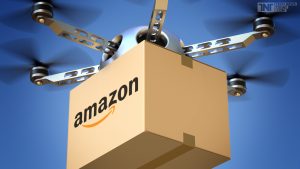
Taken from Citius Minds.com
http://www.citiusminds.com/blog/amazon-patents-a-drone-capable-of-in-flight-adjustments-to-achieve-efficacy/
After purchasing something on Amazon this weekend (as usual), I had to decide what shipping option to use and it reminded me of something we have talked about in tutorial recently: the potential for drone delivery in the future. While doing research on this topic, I came across a fellow Sauder student’s blog titled “Drones Delivering Innovation”. In his blog, Brendan Woodward talks about how autonomous drone technology has improved vastly over the past few years and the various applications it could be used for in the future. The benefits realized by the use of this new technology could be dramatic, but are they practical?
One of the main drawbacks I found while researching this topic was the carrying capacity of a drone. Unlike a large delivery truck that can carefully plan out its route and deliver many packages in a sequence, a drone can only take one package at a time. This means that in-between every shipment, the drone would need to fly back to the Amazon facility and get a new package. Without question, this would add extra time between deliveries and use up a massive amount of power. To keep up with demand, Amazon would need to have an astronomical number of drones constantly in rotation, and while some are charging, others are making deliveries. Also, as Mr. Woodward mentions, with these being autonomous drones, there are many complications that could arise, including how to prevent collisions with other objects or even animals. As one could imagine, these issues could significantly increase the cost of shipping which would ultimately be paid by the buyer or the seller.
Personally, I find this application of technology very interesting, but is it practical from a business standpoint? With current technology, I unfortunately don’t see this concept working on a national scale. The extra costs involved, and the number of drones needed to make this concept work may be too much for any company to handle. For the time being, I think this concept needs to remain a small-scale novelty service until technology improves.
Once these kinks are figured out, I think Amazon should pursue this concept. The two main advantages I can see are vertical integration and “blue ocean”. First off, if they start shipping using drones, this will cut out the need for them to use companies such as UPS and Fed-Ex. This gives them greater control over their operations. The other advantage is the “blue ocean”. No other company is using such a novel method of delivery right now and it would give them a point of difference to separate them from their competitors.
Word Count: 436

